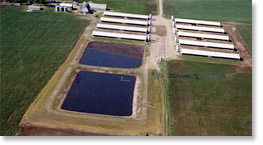|
New Report
Exposes Subsidies to Factory Farms Family Farm Groups Demand Reform Of Environmental Quality Incentives Program by Tim Gibbons Columbia, Missouri |
||||
Representatives of the Campaign for Family Farms and the Environment (CFFE), a coalition of family farm organizations in the Midwest, say the report gives further evidence that the factory farm industry is reliant on taxpayer funding. “This report demonstrates what family farmers have known for years -- this corporate-controlled, industrial model of livestock production can’t survive without taxpayer support,” said Rhonda Perry, a livestock farmer with the Missouri Rural Crisis Center from Howard County, Missouri. “Taxpayers should not have to foot-the-bill for this corporate welfare that is fueling the industrialization of the livestock industry at the expense of family farmers, rural communities and the environment.” EQIP was established in the 1996 Farm Bill as a cost-share program targeted at family farmers to help them incorporate conservation practices into their farming operations. However, the 2002 Farm Bill opened the program to factory farms, allowing them to use EQIP to help them expand their operations to the tune of $450,000 over five years. “I have used the EQIP program and found it to be valuable,” said Jon Peterson, Land Stewardship Project member and dairy farmer from Peterson, Minnesota. “I believe the focus has shifted from helping small to midsize operations find cost effective solutions to environmental concerns. It now seems to be a production subsidy to help large confinement operations expand. It is as if the bigger the pollution risk an applicant can create the greater his chances of getting funding.” In addition to highlighting factory farms’ excessive use of EQIP funds, the report also points to a lack of disclosure within the taxpayer-funded program. A provision in the 2002 Farm Bill prohibited the USDA from releasing specific information about conservation contracts -- how participants in these taxpayer-funded programs are using the money. “That means that the public can't evaluate whether program funds are being used effectively and whether they result in real environmental benefits,” said Elanor Starmer, the author of the report. “There is no reason to restrict public access to conservation payment information when we can access information on other programs, such as commodity payments. As it stands, EQIP suffers from an unacceptable lack of accountability.” At the insistence of family farm organizations nationwide, the 2008 Farm Bill lowered the amount of funding operations can receive through EQIP from $450,000 to $300,000 over the life of the Farm Bill. USDA will likely conduct rulemaking before the end of the year. As a part of that process, there will be an opportunity for the public to weigh in during the comment period. CFFE is also urging Congress and President-Elect Obama to reform the program based on the report’s recommendations:
“During his campaign, President-Elect Obama said conservation programs like EQIP should help family farmers use good environmental practices, not fund corporate expansion,” said Vern Tigges, member of Iowa Citizens for Community Improvement and family farmer from Carroll, Iowa. “He needs to make this a priority and stop factory farms from abusing taxpayer-funded programs like EQIP.” |
||||
|
Published in In Motion Magazine December 23, 2008. Also see:
|
||||
If you have any thoughts on this or would like to contribute to an ongoing discussion in the  What is New? || Affirmative Action || Art Changes || Autonomy: Chiapas - California || Community Images || Education Rights || E-mail, Opinions and Discussion || En español || Essays from Ireland || Global Eyes || Healthcare || Human Rights/Civil Rights || Piri Thomas || Photo of the Week || QA: Interviews || Region || Rural America || Search || Donate || To be notified of new articles || Survey || In Motion Magazine's Store || In Motion Magazine Staff || In Unity Book of Photos || Links Around The World || OneWorld / US || NPC Productions Copyright © 1995-2011 NPC Productions as a compilation. All Rights Reserved. |


